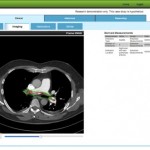 Despite Watson’s initial forays being into consumer behavior fields, there remains the hope that it will make a prolonged and substantial impact in areas such as healthcare.
Despite Watson’s initial forays being into consumer behavior fields, there remains the hope that it will make a prolonged and substantial impact in areas such as healthcare.
A glimpse of what’s possible is provided via a new application which is going by the name of Avicenna, which aims to become an invaluable aid to radiologists.
It hopes to identify anatomical features and abnormalities in medical images, and by taking this analysis and cross-referencing it with the patient’s medical record provide support for a successful diagnosis.
Quicker and more effective
The aim is for the service to make the work of cardiologists and radiologists quicker and more effective. It is still very much in the early stages of development and is being trained on anonymized images in cardiology and breast radiology areas.
The next stage is to take it out of the lab and start testing it on some real patient data.
The software uses a range of image processing algorithms to explore each image with what the team hope is an expert eye. For instance, the software is capable of detecting abnormalities or identify organs.
This image processing function sits alongside functions for analyzing text and medical test results. It then pulls all of this together into a reasoning engine that uses the data to produce a diagnosis.
Initial results
In initial tests, the system was capable of detecting potential embolisms with a similar degree of accuracy to that of a human radiologist. With further training however, the hope is that it will get better still.
Of course, this project is still at a very early stage and there is an awful lot more work needed before it can be let loose in a hospital near you, but it is nonetheless a sign of things to come, and IBM together with other companies tackling this same issue, are making rapid progress.
Central to the success of such ventures will be the amount of data that’s available to train the machines, and in that sense IBM have a clear advantage as they already have a huge library of medical images and records they can use to train their algorithms.
Only last year, for instance, they bought a library of several billion medical images through it’s acquisition of Merge Healthcare, and whilst those images aren’t currently being used to train Avicenna, they hope to be available shortly.
It’s a fascinating field and one that will be worth keeping an eye on.